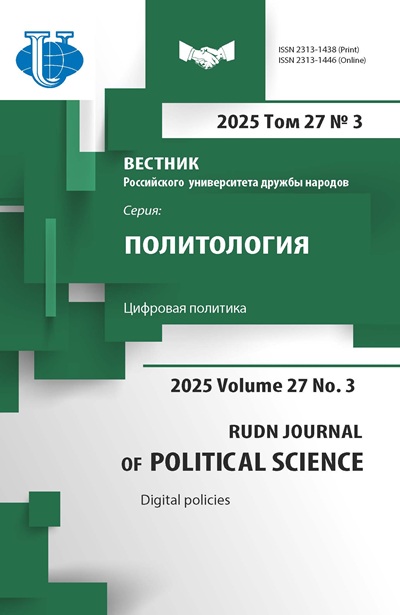Digital Sovereignty in the South Caucasus: Navigating Challenges Towards Integration within Global Digital Corridors
- 作者: Davtyan V.S.1,2
-
隶属关系:
- Russian-Armenian University
- Institute of China and Modern Asia, Russian Academy of Sciences
- 期: 卷 27, 编号 3 (2025): Digital policies
- 页面: 560-578
- 栏目: DIGITAL SOVEREIGNTY
- URL: https://journal-vniispk.ru/2313-1438/article/view/348836
- DOI: https://doi.org/10.22363/2313-1438-2025-27-3-560-578
- EDN: https://elibrary.ru/NFGVYC
- ID: 348836
如何引用文章
全文:
详细
The article explores key challenges in the formation and development of digital sovereignty across the South Caucasus region. Adopting a political science perspective, it outlines the conceptual framework of the study, which focuses on assessing the level of digital advancement and sovereignty in the context of emerging regional security risks and threats. The analysis examines the institutional foundations underpinning digital infrastructure development in the region, offering an assessment of national readiness for digital transformation. Particular emphasis is placed on the legislative regulation of the digital sector, as well as on strategic approaches to digital development and sovereignty as reflected in national policy documents. The study demonstrates that the ongoing strategic competition between the “North-South” and “East-West” transport and logistics corridors in the South Caucasus also shapes the logic and geography of emerging digital routes. In this context, multilateral integration into international internet traffic corridors is identified as a critical challenge for diversifying access routes, enhancing national digital security, and strengthening digital sovereignty. The analysis of the logistical architecture of digital corridors - at both regional and macro-regional levels - enables the identification of the main barriers and prospects for digital integration in the South Caucasus. Methodologically, the study employs a cross-country comparative approach alongside quantitative measures of digitalization, including the Network Readiness Index, mobile and fixed internet penetration, and related indicators.
作者简介
Vahe Davtyan
Russian-Armenian University; Institute of China and Modern Asia, Russian Academy of Sciences
编辑信件的主要联系方式.
Email: vahedavtyan@yandex.ru
ORCID iD: 0000-0002-0848-3436
Doctor of Political Sciences, Professor, Professor at the Department of Political Science of Russian-Armenian Universuty, Senior Researcher of the Sector of Caucasian Studies of the Institute of China and Modern Asia of the Russian Academy of Sciences
Yerevan, Republic of Armenia; Moscow, Russian Federation参考
- Butorov, A.S., Turava, G.M., & Pliev, S.M. (2022). Features of Russian Influence on Regional Security in the South Caucasus. Post-Soviet Studies, 5(8), 780–786. (In Russ.). EDN: JGJSNO
- Couture, S., Toupin, S. (2019). What does the notion of “sovereignty” mean when referring to the digital? New Media & Society, 21(10), 2305–2322 / https://doi.org/10.1177/1461444819865984
- Davtyan, V.S., & Margaryan, N.I. (2022). Transport Communications of the South Caucasus After the War in Nagorno-Karabakh. Russia and New States of Eurasia, I (LIV), 123–135. (In Russ.). https://doi.org/10.20542/2073-4786-2022-1-123-135 EDN: HQRTFY
- Fedorovskaya, I. (2022). Transport Infrastructure Development Projects in Transcaucasia. Russia and New States of Eurasia, (IV), 123–131. (In Russ.). https://doi.org/10.20542/2073-4786-2022-4-123-131 EDN: YFRWMD
- Gamza, L.A. (2022). China’s Digital Silk Road. Problems of the Far East, (2), 63–79. (In Russ.). https://doi.org/10.31857/S013128120019578-6 EDN: LJYUAW
- Harutyunyan, G.A. (2020). Armenia on the Path to Digitalization. Issues of Management and Economics: Current State of Relevant Problems. Proceedings of the XLII International Scientific and Practical Conference. Moscow: Interscience Publishing House, pp. 86–91. (In Russ.).
- Hasanov, A.M. (2014). National Development and Security Policy of the Republic of Azerbaijan. Baku: “Zərdabi LTD” MMC, 672 p. (In Russ.).
- Huseynova, A.D., & Mazanova, O. (2020). Expansion of E-Service. In Azerbaijan: Directions and Perspectives. 55th International Scientific Conference on Economic and Social Development Development. Baku, Azerbaijan, 14–17 February 2020 (vol. 2, pp. 656–662).
- Kardumyan, V. (2013). Collective Security in the South Caucasus: Conceptual Aspect. Russia and New States of Eurasia, (3), 15–23. (In Russ.). EDN: SVKQSB
- Kochetkov, A.P., & Maslov, K.V. (2022). Digital Sovereignty as the Basis of National Russia in the Global Digital Society. Moscow University Bulletin. Series 12: Political Science, (2), 31–45. (In Russ.). EDN: BJJUXI
- Liu Yizhu, Avdokushin E.F. (2019). Formation of the Foundations of the “Digital Silk Road”. World of the New Economy, 13(3), 62–71. (In Russ.). https://doi.org/10.26794/2220-6469-2019-13-4-62-71 EDN: JKFHZL
- Nikonov, V.A., Voronov, A.S., Sazhina, V.A., Volodenkov, S.V., & Rybakova, M.V. (2021). Digital Sovereignty of the Modern State: Content and Structural Components (Based on Expert Research). Tomsk State University Journal of Philosophy, Sociology and Political Science, (60), 206–216. (In Russ.). https://doi.org/10.17223/1998863Х/60/18 EDN: PCWPLD
- Omarova, T., & Sharipova, D. (2022). Digitalization of Public Service Delivery and Innovations in the Activities of State Bodies in Central Asia and the Caucasus. International Journal of Civil Service Reform and Practice, 7(1). https://doi.org/10.56289/ijcsrp.159
- Romanova, T. (2023). Evolution of the Concept of “Digital Sovereignty” in the European Union: Constants and Dichotomies. Contemporary Europe, (4), 62–76. (In Russ.). https://doi.org/10.31857/S0201708323040022 EDN: BVRRNQ
- Romashkina, A.B., & Kirichuk, D.A. (2023). Political Agency of Digital Actants in the Context of Ensuring Digital Sovereignty. RUDN Journal of Political Science, 25(4), 848–861. (In Russ.). https://doi.org/10.22363/2313-1438-2023-25-4-848-861 EDN: WRRDXQ
- Ure, J. (2021). Digital Solutions Centre in Central Asia. Asia-Pacific Information Superhighway Working Paper. Series No. 7. October 2021. 54 p.
- Vinnik, D.V. (2014). Digital Sovereignty: Political and Legal Regimes of Data Filtering. Philosophy of Science, (2), 95–113. (In Russ.). EDN: SMIDUD
- Zinovieva, E., Bulva V. (2021). Digital Sovereignty of the European Union. Contemporary Europe, (2), 40–49. (In Russ.). https://doi.org/http://dx.doi.org/10.15211/soveurope220214049 EDN: IOMTFV
补充文件








